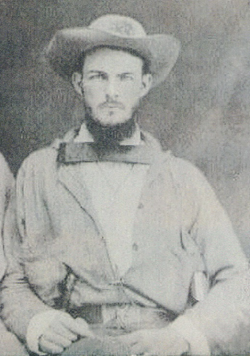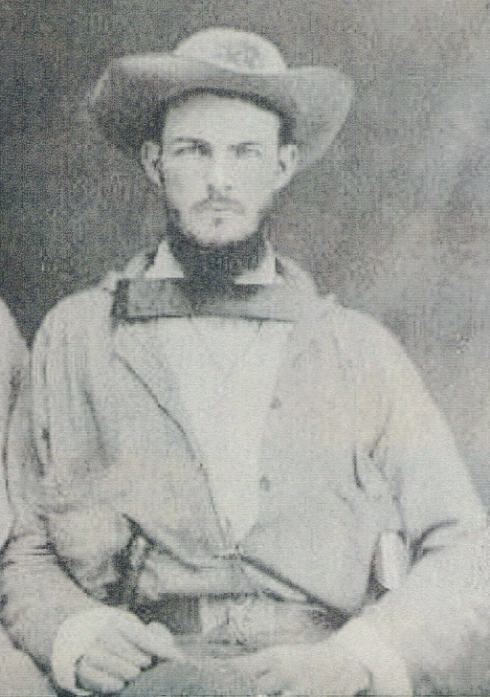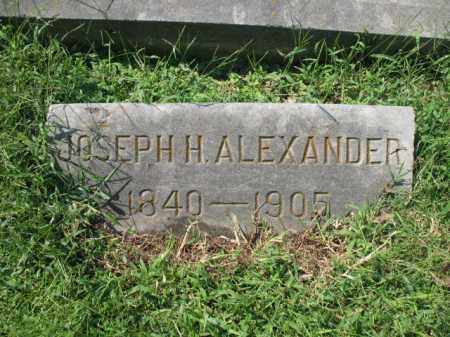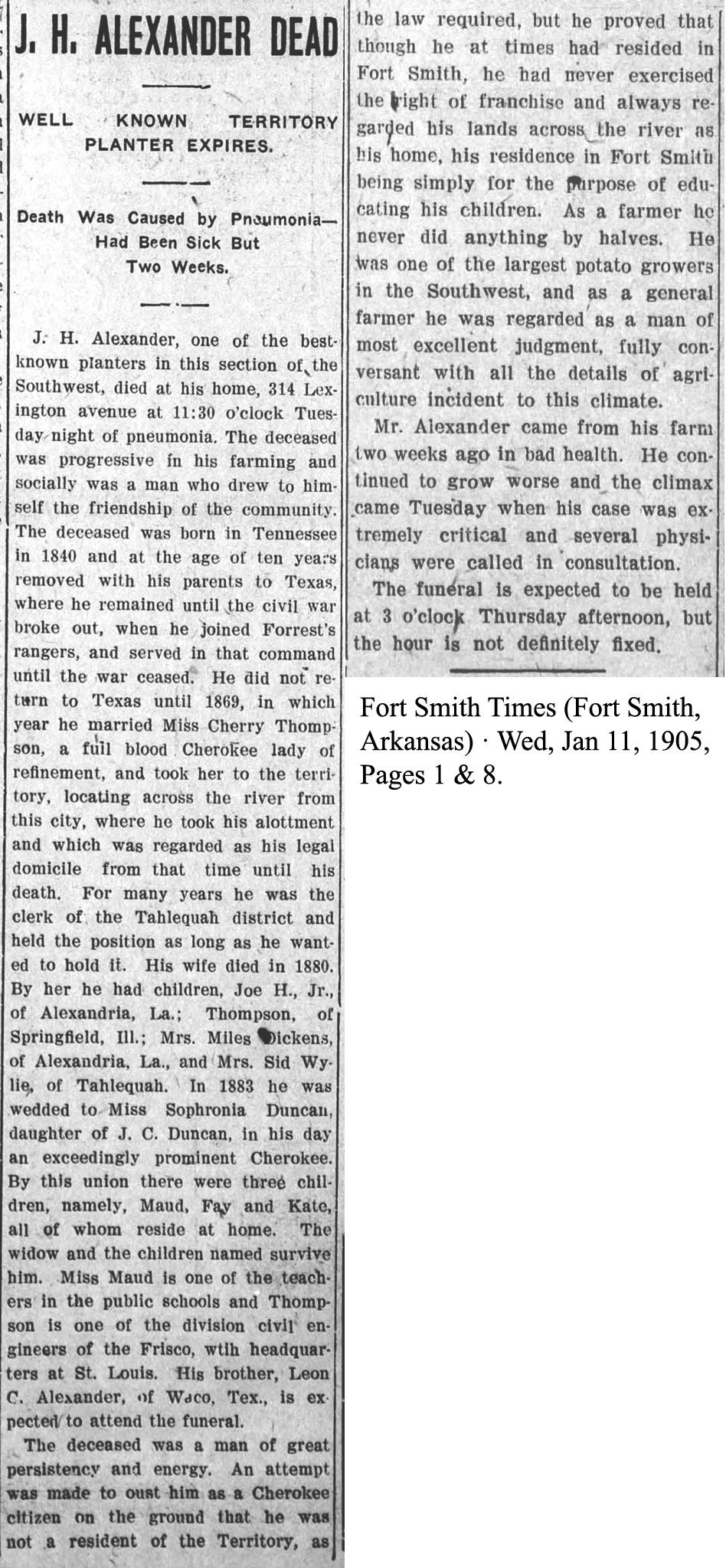Broadfoot's 'Confederate Military History Vol. XIV' states:
'Captain Joseph H. Alexander, of Fort Scott, a survivor of one of the most famous cavalry commands of the Confederate army, was born in Fayette County, Tenn., December 14, 1840. His father, Silas A. Alexander, was a Captain of the State Militia of Tennessee, in the War of 1812, and three of his ancestors were signers of the Mecklenburg Declaration of Independence. The subject of this sketch was reared in Texas, and when the military strength of the South was called into the field, he went to the front as a private in Company K, Eight Regiment, Texas Cavalry, under Col. Frank Terry, a command more familiarly known as Terry's Texas Rangers.
The regiment was organized at Houston, Tex., joined the forces of Gen. Albert Sidney Johnston at Bowling Green, KY., and at once engaged in active duty.
Private Alexander was with the command in its first fight, Woodsonville, December 17th, 1861, where Colonel Terry was killed, and at the Battle of Shiloh, under Colonel Wharton he had his horse killed under him.
He was in active service during the siege of Corinth, and in July 1862, participated in the famous victory at Murfreesboro, Tenn., where the Rangers, led by Gen N. B. Forrest, and supported by the Second Georgia Cavalry and parts of other commands, after a ride of fifty miles from Chattanooga, attacked the Federal garrison, and captured about 1,200 prisoners and four pieces of artillery. The Rangers suffered severe loss in this fight, and Captain Alexander in the thickest of the fight was again temporarily dismounted by the killing of his horse. The Kentucky campaign followed, in which the Rangers were constantly in action under the lead of Forrest until the retreat to Chattanooga. They fought under Wharton and Wheeler at the second battle of Murfreesboro, and at Chickamauga and in the subsequent campaigns in Col. Thomas Harrison's brigade of Gen. Joseph Wheeler's Cavalry, taking part in the battles from Dalton to Atlanta, and around that city, the raid through Tennessee, and the incessant fighting of Wheeler's cavalry during Sherman's advance to Savannah and toward Virginia.
When the army surrendered in North Carolina, Captain Alexander refused to capitulate and started for Texas, where it was hoped the struggle might be continued, but on reaching Columbus, Miss., he gave his parole.
On returning to his father's farm in Texas, he engaged in farming, and three years later removed to Fort Smith, where he is now one of the most successful farmers of that region, owning large tracts of land both in Arkansas and the Territory.'
Contributor: Travis Holt (48272081) •
**He was considered one of the largest potato growers in the Southwest**
Broadfoot's 'Confederate Military History Vol. XIV' states:
'Captain Joseph H. Alexander, of Fort Scott, a survivor of one of the most famous cavalry commands of the Confederate army, was born in Fayette County, Tenn., December 14, 1840. His father, Silas A. Alexander, was a Captain of the State Militia of Tennessee, in the War of 1812, and three of his ancestors were signers of the Mecklenburg Declaration of Independence. The subject of this sketch was reared in Texas, and when the military strength of the South was called into the field, he went to the front as a private in Company K, Eight Regiment, Texas Cavalry, under Col. Frank Terry, a command more familiarly known as Terry's Texas Rangers.
The regiment was organized at Houston, Tex., joined the forces of Gen. Albert Sidney Johnston at Bowling Green, KY., and at once engaged in active duty.
Private Alexander was with the command in its first fight, Woodsonville, December 17th, 1861, where Colonel Terry was killed, and at the Battle of Shiloh, under Colonel Wharton he had his horse killed under him.
He was in active service during the siege of Corinth, and in July 1862, participated in the famous victory at Murfreesboro, Tenn., where the Rangers, led by Gen N. B. Forrest, and supported by the Second Georgia Cavalry and parts of other commands, after a ride of fifty miles from Chattanooga, attacked the Federal garrison, and captured about 1,200 prisoners and four pieces of artillery. The Rangers suffered severe loss in this fight, and Captain Alexander in the thickest of the fight was again temporarily dismounted by the killing of his horse. The Kentucky campaign followed, in which the Rangers were constantly in action under the lead of Forrest until the retreat to Chattanooga. They fought under Wharton and Wheeler at the second battle of Murfreesboro, and at Chickamauga and in the subsequent campaigns in Col. Thomas Harrison's brigade of Gen. Joseph Wheeler's Cavalry, taking part in the battles from Dalton to Atlanta, and around that city, the raid through Tennessee, and the incessant fighting of Wheeler's cavalry during Sherman's advance to Savannah and toward Virginia.
When the army surrendered in North Carolina, Captain Alexander refused to capitulate and started for Texas, where it was hoped the struggle might be continued, but on reaching Columbus, Miss., he gave his parole.
On returning to his father's farm in Texas, he engaged in farming, and three years later removed to Fort Smith, where he is now one of the most successful farmers of that region, owning large tracts of land both in Arkansas and the Territory.'
Contributor: Travis Holt (48272081) •
**He was considered one of the largest potato growers in the Southwest**
Gravesite Details
C.S.A. - Terry's Texas Rangers
Family Members
-
![]()
Lon Alexander
1868–1871
-
![]()
Thompson Alexander
1869–1926
-
![]()
Joe Alexander
1872–1921
-
![]()
Arrenia Alexander
1875–1889
-
![]()
Irene Alexander Dickins
1875–1967
-
![]()
Robert L Alexander
1877–1877
-
Lillian Alexander Wyly
1880–1977
-
![]()
Maude Duncan Alexander Janney
1884–1984
-
![]()
Duncan Alexander
1886–1887
-
![]()
Fay Alexander Kelley
1888–1968
-
![]()
Katharine "Kate" Alexander Brady
1897–1977
Sponsored by Ancestry
Advertisement
Advertisement


























